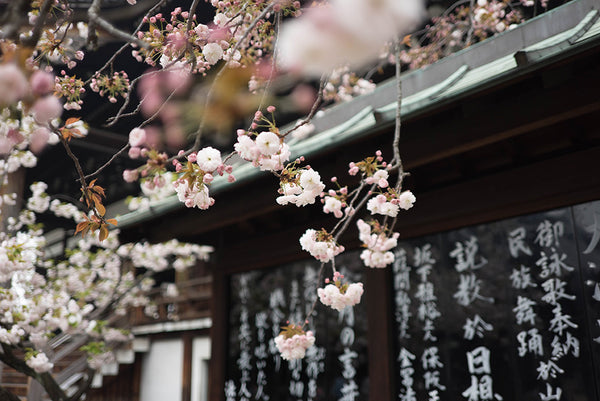You have to experience it at least once in your life: the beautiful Japanese tea ceremony or chadô or cha no yu in Japanese. Literally this means “the way of tea” or “hot water for tea”.
This ritual stands for simplicity and unites tradition with art. There is therefore a wonderful history behind this drink. Today we tell you everything you need to know about tea ceremonies: from the origins to studies that you can follow and how a tea ceremony actually works. Curious? Then read on quickly!
Origin of the tea ceremony
Tea has long been known in China for its health benefits. Buddhist monks brought tea from China on their pilgrimages, bringing it to Japan. Unlike the Chinese, who drink tea for relaxation, taste and smell, the Japanese made this a true art. In addition, drinking tea was accompanied by ceremonies and learning this art can take years.
Tea is one of the oldest known hot drinks. There are various legends and stories about it, just like the legend of Shen Nung that goes back to the year 2737. Emperor Shen Nung boiled his water from a hygienic point of view. While the emperor was quietly sipping his cup of water outside, the wind was blowing so hard that some leaves from the bushes ended up in his cup. He himself found the taste refreshing and according to this legend, Chinese people would have started drinking tea from this moment on.
However, the exact history of tea will always remain a mystery. Still, a few things are certain. It is known that tea was only drunk as a medicine and tonic after its discovery. The tea leaves were steamed and then finely ground, after which the pieces were boiled and the infusion was drunk. From the 13th century Matcha was introduced to Japan and since then it has been drunk during special ceremonies.

A unique and enlightening experience
A traditional Japanese tea ceremony takes place in the host's tea house, also known as chashitsu. Usually such a house is located far in a tea garden. The walk through the garden and to the tea house is attuned to the principles of Zen and Feng Shui, it is a kind of mental preparation for the ceremony. The tea house itself is sober and sleek, so that you can fully focus on the moment. Drinking tea is done in silence.
To maintain that concentration, strict actions take place: these are rituals and prescribed customs that must be observed in order to reach a certain state of mind (wabi). It is part of a Zen Buddhist experience, so that every action must be performed with precision.
So how exactly does such a ceremony work? We list the main actions for you!
Actions during the ceremony
The host greets his guests with a deep bow. Then all the guests walk one after the other through the garden, washing their face and hands at a basin of water before entering the tea house. Due to the low opening, people usually enter on their knees, which promotes a sense of humility for each other and also shows the disappearance of ranks.
First, a light meal consisting of several courses is served. After this meal, the host serves sweets to prepare the guests for tea. After drinking the tea, the first part of the ceremony is already done. While waiting for the second part, the guests go to the tea garden.
By sounding the gong, the host makes it clear that the guests are welcome for the second part of the ceremony. In contrast to the first part, the second part is allowed to speak softly. This part is less formal.
The host then starts preparing the tea with strict hand gestures and movements. After the preparation, the host puts down the bowl of green tea. One of the guests takes the cup, takes three sips, then wipes the rim with a damp cloth and passes the bowl to the next guest.
Finally, sweet snacks are served and guests drink a thin tea. The guests have one last conversation after which the ceremony is over.
Learn from a real tea master
Can't get enough of tea and are you already eager to get started yourself? Then follow a course at a real tea school! Several tea schools have been established over the years. The most famous two are the Urasenke Tea School and the Omotesenke Tea School . Senke means tea school in Japanese.
There have been many famous tea masters in history. The Buddhist monk Jukô (1422-1502) was the first to draw up important rules for the tea ceremony. Other tea masters such as Murata Mokichi Shukô (1423-1502) and Takeno Jôô (1502-1555) contributed to the way in which the tea ceremony is still performed today.
Have you ever experienced a real tea ceremony yourself? Be sure to let us know!




Comments
graag meer informatie , wij zijn 10 jaar tai-Chi en qigong docente en zou graag een thee ceremonie doen . Kunt U ons op weg helpen ? Erg bedank voor U antwoord .
Francine .
Bij mij thuis kan u onderricht in Chado volgen op maandagmorgen en vrijdagavond.
Donderdagavond eveneens online. Ik ben Urasenke tea instructor.
Ik kan ook een theeceremonie verzorgen op afspraak (tot 6 gasten)
Uitzonderlijk kan het ook op verplaatsing indien geschikte lokatie.
HEEL erg interesseren om een cursus te volgen .
Ik zie dat er mensen vragen waar men theeceremonie kan meemaken of studeren: dit kan bij mij in Berlaar. Ik ben theemeester in de Urasenke traditie en heb een theehuis in mijn tuin. De lessen zijn wekelijks op maandagmorgen of vrijdag avond.
www.stafdaems.be
International Tea & Coffee Academy heeft dagtrainingen en jaaropleidingen Thee. Super bedrijf!!
In september 2019 gaat de Japanse Ryokan(Japans hoel/B&B) in Warffum(Groningen) weer open. Hier kun je ook een Japanse theeceremonie boeken.
Voor meer info:
https://japanshuis-bbgroningen.nl/ryokan-%e6%97%85%e9%a4%a8/
Beste,
Bestaat er de mogelijkheid dat iemand een theeceremonie geeft op verplaatsing? Ik zoek namelijk iemand die tijdens een event rond rituelen een ceremonie geeft bij SO – the best of both worlds in Leuven. Op 27 oktober om 11u. Dank voor uw antwoord. Vriendelijke groeten, Mireille Van Dessel
Ik zou graag een gedegen cursus willen volgen. Kunt u mij daar enige informatie over geven?
Hallo,
Is het mogelijk dat mijn vriendin en ik een theeceremonie mogen meemaken?
Ik wil graag de japanse theecermonie meemaken – cursus volgen… waar kan dit?